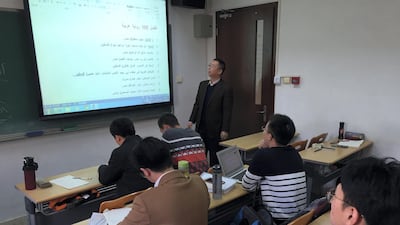When Luo Zi Wei was deciding what language to study, Spanish was the most popular language course at her university and Arabic the least popular.
But the week before she made her decision the Arabic lecturer gave a passionate speech listing the benefits of learning the language: good job prospects and the challenge of studying the hardest language in the world. Luo was persuaded.
That was five years ago. Now she is part of a growing number of young Chinese who are choosing Arabic as the foreign language to study at university. According to Lin Feng Min, the director of the Arabic department at Peking University's language school, they have had to print 20 per cent more national test papers in the last three years, indicating a commensurate rise in the number studying Arabic.
Ms Luo, 24, graduated in Arabic literature from Sun Yat-sen University, in Guangdong Province in 2016. She says the semester she spent in Jordan was revealing. "It's not so conservative. Teachers and Jordanians were open minded. Many Muslim women chose not to wear the hijab." However the Jordanians she met knew little about China.
So why study Arabic? Lin Feng Min says most students choose to study the language because they feel it leads to better career opportunities, while others are interested in Arabic culture. A minority are also Chinese Muslims who wish to learn more about Islamic culture and traditions.
For Han Yiying, 20, a current third-year student at Peking University, it was Arabic music that inspired her to learn the language. "Its grammar and some pronunciation of some letters are totally different from Chinese or English so I found it hard to begin learning Arabic, but it got easier after I got used to the grammar," she said. She hopes to work in the ministry of foreign affairs.
Fang Ting, 30, works for the Red Cross in Beijing and studied Arabic for a year in Yemen in 2014. He says it took him three months to learn how to produce the distinctive "glottal trembling" required for Arabic — and then he hit another obstacle.
"I learnt standard Arabic but when you go on the street people speak dialect. This is a problem when there is limited dialectal teaching or materials," he said.
Read more: Exclusive: Duolingo launches Arabic for English speakers
Mr Lin agrees that coping with all the various Arabic dialects is "really a big problem." In an attempt to tackle it, the Arabic department at Peking University introduced a Cairo dialect module.
Zhang Bo, 32, a news anchor for CGTN Arabic, a TV station, says the opportunities for Arabic speakers in China have increased since he graduated in 2007, not least with more international media catering to Arabic-speaking audiences. He almost dropped Arabic when he was at Beijing International Studies University because the language was so difficult, but he is glad he stuck it out.
"The process of learning Arabic in college helped me gain a capability in overcoming any difficulty in life. If I could conquer this language, to some extent I could achieve anything", he says.
Many Chinese students of Arabic base themselves in Cairo. Duan Jiuzhou is a PhD student from Tsinghua University, and a visiting scholar at the American University in Cairo says the historical relationship between Egypt and China, — the first Chinese students arrived in the 1930s — accounts for its enduring legacy as a centre of Arabic scholarship for the Chinese.
Mr Zhang sees the One Belt, One Road (OBOR) initiative, which will cross many Arabic-speaking countries, as offering big opportunities. And in his line of work, the region is a hot spot for news.
However, Luo Zi Wei, says those new opportunities have not materialised yet and when they do, female graduates face discrimination when applying for Arabic-related jobs as companies usually prefer to hire men, especially for overseas. "The boys in my class were not so good but six of them found Arabic jobs, and three of them were sent abroad," she says.
Mr Fang Ting also believes the "not very open" labour market in Arabic-speaking countries means investing time and effort in learning Arabic could be a risk, and wishes Middle Eastern countries would offer courses to attract foreigners who are interested in learning about Arabic culture and language.
Mr Lin Feng Min is worried about the future, however. Although the number of Arabic courses — and the number of students taking them — has increased, the number of teachers has not and many are young and inexperienced.
"Teaching quality is declining", he says. But Mr Duan is still hopeful and wants to become a professor of Arabic.
"It is exotic and widely-spoken." he says. "I love it."

